|
|
|
Sort Order |
|
|
|
Items / Page
|
|
|
|
|
|
|
| Srl | Item |
| 1 |
ID:
189656


|
|
|
|
|
| Summary/Abstract |
Extensive research has been conducted in the field of peacebuilding concerning the role of civil society in peace negotiations. However, although research has stressed the importance of coordination among civil society groups, we have limited knowledge concerning the impact civil society coordination can have on the content of a peace agreement. This article addresses this gap by examining how the extent of coordination among civil society groups during peace negotiations influences the reflectiveness of a peace agreement in regard to civil society viewpoints. We argue that a high extent of coordination, where civil society actors coordinate tasks and spearhead viewpoints together, can help facilitate peace agreements that are more reflective of civil society group views. Based on a comparative analysis of Guatemala and El Salvador, the findings show that whereas coordination between different civil society groups was quite extensive in both peace processes, civil society viewpoints were inscribed into the peace agreement to a larger extent in the Guatemalan case. We identify two factors that contribute in shaping how coordination influences the content of peace accords: symmetrical transfer of information, and openness from the negotiation parties to consider suggestions from civil society.
|
|
|
|
|
|
|
|
|
|
|
|
|
|
|
|
| 2 |
ID:
165664
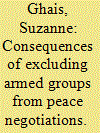

|
|
|
|
|
| Summary/Abstract |
This article examines the relationship between inclusion/exclusion of armed groups and the achievement of durable peace, using process tracing in two case studies: the peace process between the government of Chad and the rebel group Movement for Democracy and Justice in Chad, and the one between the government of the Philippines and the Moro National Liberation Front. The cases support theoretical arguments that excluded armed actors are more likely to renew armed confrontation after the peace accord. The study further elaborates the causal link: included armed rebels tend to negotiate for private benefits such as government posts and amnesty but also moderate their stances and emerge committed to the agreement; excluded armed actors lack any such commitment and still have unresolved grievances. They are thus more likely to renew armed action against the government.
|
|
|
|
|
|
|
|
|
|
|
|
|
|
|
|
| 3 |
ID:
161000
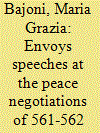

|
|
|
|
|
| Summary/Abstract |
The most prominent feature of ancient historiography appears to be the matching and welding of two essential components: narrative and speech. The rhetorical feature of envoys’ speeches should not encourage the belief that they are mere literary evidence, as their presence in the narration is normally proportional to the historian’s interest in diplomatic events. This analysis focusses on envoy speeches during the negotiations of the peace treaty of 561–562 AD between Emeror Justinian I and the Persian King Khosro I as reported by the Byzantine historian Menander the Guardsman in the fragment 6.1 of his History. Since no documents survived after the destruction of the Byzantine archives, Menander’s documents are a precious witness. The envoy’s speech was not a distinct rhetorical genre; rather, it developed from the epidictic discourse for petitions and praise during the Hellenistic and Roman eras as a means of political communication between provincial cities and the central administration. Indeed, a fiction of internationality shaped the language of Roman diplomacy until late Antiquity. The speeches delivered by Roman and Persian delegates before laying down the treaty of 561–562 display discursive strategies articulated on the sharing of communal political and moral values.
|
|
|
|
|
|
|
|
|
|
|
|
|
|
|
|
| 4 |
ID:
129906
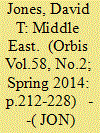

|
|
|
|
|
| Publication |
2014.
|
| Summary/Abstract |
The effort to bring peace to the Middle East has been an almost century long process. Legions of soldiers, politicians, and diplomats have attempted the political equivalent of transmuting dross into gold. They have failed; none more comprehensively than President Bill Clinton and his Middle East interlocutors. Despite personal energy, intelligence, and creativity, U.S. efforts failed. After a stretch of benign/malign neglect, Washington again is venturing into the swamp by sponsoring renewed Israeli-Palestinian negotiations. There are learnable lessons from what has been (mis)managed in the past. The question remains whether the United States will take counsel from them.
|
|
|
|
|
|
|
|
|
|
|
|
|
|
|
|
| 5 |
ID:
141711
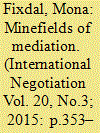

|
|
|
|
|
| Summary/Abstract |
This special issue explores significant problems of peace mediation. How do these “minefields of mediation” arise, how do mediators’ ways of handling them impact the negotiation process, and what can mediators do to overcome them? Using examples from the last quarter century, and from the Middle East in particular, the authors examine these questions at different stages of the mediation process, from its initiation to its culmination, and with reference to different forms of mediation, including facilitation, muscular, and multiparty mediation. This short introduction provides a systematic overview of some of the most pertinent mediation challenges, with reference to whothe mediators are, whenthe mediation takes place and whatthe issues of contention and possible outcomes are. These areas are of course all intertwined, and, as the articles in this issue point out, are also very much influenced by changes in the domestic, regional and international environment.
|
|
|
|
|
|
|
|
|
|
|
|
|
|
|
|
| 6 |
ID:
128255
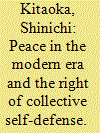

|
|
|
|
|
| Publication |
2013.
|
| Summary/Abstract |
The argument for constitutional revision has been ongoing in the post-war era but until now no action has been taken. The focal point in the discussion has been Article 9. This article argues that Japan's peace posture has not been guaranteed by Article 9. The article then turns to the right of collective defense and whether reinterpretation of Article 9 language is required in the current security environment. The conclusion calls for active and specific dialogue to resolve this issue in a timely manner.
|
|
|
|
|
|
|
|
|
|
|
|
|
|
|
|
| 7 |
ID:
094519
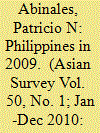

|
|
|
| 8 |
ID:
190020
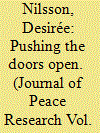

|
|
|
|
|
| Summary/Abstract |
Whereas previous research shows that peace agreements which include a broad segment of society are more likely to lead to sustainable peace, little effort has gone into explaining inclusion itself. We address this gap in the literature by providing the first large-N study to examine the causes of inclusive peace negotiations across civil wars. We argue that civil society actors can gain leverage through mobilization of civilian protest, or build trust through dialogue efforts, thereby enhancing the chances of inclusion of non-warring actors at the negotiation table. The argument is examined by analysing unique and new monthly data on peacemaking efforts in all intrastate armed conflicts in Africa and the Americas, 1989–2018, including measures beyond mere nominal participation, such as whether civil society actors or political parties had substantive roles as either mediators or full participants at the peace talks. Our findings show that protests by civil society actors increase the likelihood that non-warring actors will have a seat at the negotiation table, whereas we find no such effect concerning dialogue efforts. The article contributes by providing new insights into how nonviolent action can shape peace processes by opening the doors to negotiations and is thus part of an emerging research agenda that seeks to bring together the fields of civil resistance and inclusive peace processes.
|
|
|
|
|
|
|
|
|
|
|
|
|
|
|
|
| 9 |
ID:
143900
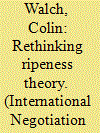

|
|
|
|
|
| Summary/Abstract |
How can ripeness theory be extended to explain when and why parties remain at the negotiating table until an agreement is reached? Existing ripeness theory is crucial in understanding when conflicting parties consider negotiation as preferable to continued fighting. However, factors which may explain why parties stay at the negotiation table after the start of the negotiation process – that is, how the ripe moment is sustained until an agreement has been reached – are not well elaborated. This study seeks to extend ripeness theory and argues that organizationally fragmented rebel groups are less flexible to make concessions and unlikely to stay at the negotiation table until an agreement is reached, especially when there is a lack of cohesion between the military and political branches. This argument is explored through a structured focused comparison of the peace negotiations in Colombia and in the Philippines with communist rebel groups.
|
|
|
|
|
|
|
|
|
|
|
|
|
|
|
|
|
|
|
|
|